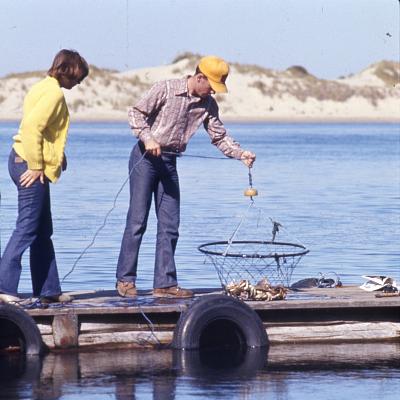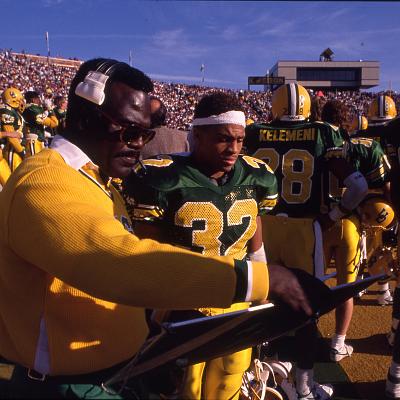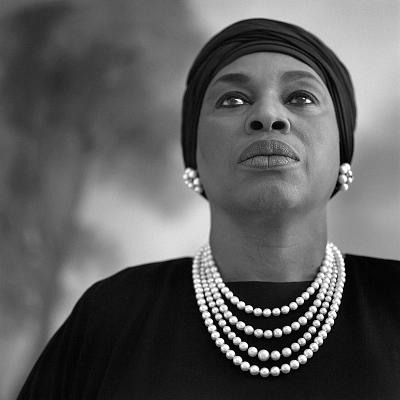Evolution of a Moment:
The Photographs of Brian Lanker
An Exhibit in Knight Library, Fall 2025 - Spring 2026
Story by Jason Stone | Photos from the Brian Lanker Collection, Special Collections and University Archives
The University of Oregon Libraries is proud to announce Evolution of a Moment: The Photographs of Brian Lanker, a major exhibition on display in Knight Library and open to the public throughout the 2025–26 academic year. A selection of ten Lanker photographs will be concurrently exhibited in the UO Portland Library.

Local legend Brian Lanker (1947-2011) was far from an ordinary photographer. Awarded the Pulitzer Prize in 1973 for his groundbreaking photo essay on childbirth, he was instantly established as a world-class photojournalist at the age of just 27. Over the decades that followed, Lanker built a dynamic career as a documentary and commercial photographer, filmmaker, author, and visual artist.
Thanks to a partial purchase and generous donation from the Lanker family, his rich archive is now publicly accessible through the University of Oregon Libraries' Special Collections and University Archives—offering rare insight into his profound vision, his editorial decision-making, and his incredible breadth of subjects.
Drawing from this extensive archives—including prints, contact sheets, editorial records, and correspondence—Evolution of a Moment highlights four distinctive themes and eras of Lanker's eclectic body of work:

On the heels of winning the Pulitzer Prize, Lanker accepted a job as graphics director for the Register-Guard and relocated to Eugene, Oregon, where he would make his home for the remainder of his life. During his tenure with the paper, he modernized its look, integrating photography, layout, and graphic design into a cohesive visual strategy. Topics of national significance became central in the Register-Guard’s coverage—from environmental issues to the challenges associated with living an incarcerated life.

Lanker’s sports photography expertly captured movement, pivotal moments, and the humanity of athletes, coaches, and spectators alike. His time with the Register-Guard coincided with an ascendant period for Duck athletics and Lanker was on the scene to shoot striking images of soon-to-be legends like Bill Bowerman and Steve Prefontaine. He also excelled at capturing the energy of spectator crowds in shots of Autzen Stadium, McArthur Court, and Hayward Field.

After leaving the Register-Guard in 1982 to become a full-time freelance photographer, Lanker began taking on high-profile stories for publications such as National Geographic, Time, and Sports Illustrated. With his unique sensibility and exceptional drive for perfection, Lanker’s work was highly in demand. During this time, he photographed many luminary cultural figures and created advertising campaigns for major brands like Nike and Dockers.


Humanity is universal. Brian has an intuitive mind, an intuitive eye. I've talked to many of the other women in the book and they all found the interview with Brian to be a catharsis. He made me cry, and I don't cry in front of people. ... He made himself vulnerable with his openness, honesty and sincerity and we responded in kind. Mostly, he listened.
For many, the book I Dream a World: Portraits of Black Women Who Changed America and its accompanying museum exhibit represent the capstone of Lanker’s highly accomplished career. Published in 1989, the book was critically acclaimed and went on to sell more than 450,000 copies. When the photos were shown later that year at Washington’s Corcoran Gallery of Art, attendance records for the historic institution were broken. In 2022 the photos were again showcased at the Smithsonian Institution’s National Portrait Gallery.
“From groundbreaking artists like Alice Walker and Leontyne Price to Civil Rights leaders like Dorothy Height and Septima Poinsette Clark—whose striking profile adorns both the book cover and our exhibit posters—Lanker was determined to help assure that these historical lives would always be remembered,” said Danielle Mericle, curator of visual materials for Special Collections and co-curator of the Evolution of a Moment exhibit.

Lanker brought the same intentionality and sense of empathy to his work with other subjects. Contracted to shoot pop-culture stars like Muhammad Ali, Johnny Cash, and Tina Turner for national magazines, he always sought to capture the essence of the person, not their celebrity persona.
Living and working in Eugene also afforded him with ample opportunities to shoot UO athletics during an ascendant period for the program—this work includes iconic portraits of legendary Ducks like Bill Bowerman and Steve Prefontaine but also demonstrates the photographer’s propensity for focusing on the crowds of “ordinary fans” who cheered from the stands and sidelines.
"He expertly captured the humanity of athletes, coaches, and spectators alike,” said Athletics Archivist Lauren Goss, who collaborated with Mericle to curate the exhibit. “Like many great sports photographers, Lanker seemed to just have a knack for being in the right spot, at the right time to capture the peak of action—but it was his simultaneously improvisational and strategic approach that actually made him excel."
Combining expertise and perspectives from two distinct areas of archival practice, Evolution of a Moment offers a unique lens into Lanker's creative process and visual storytelling.
Evolution of a Moment: Opening Reception and Panel Discussion
Wednesday, November 19, 5-7 p.m. at Knight Library Browsing Room
- David Ewald, Professor of Practice, School of Journalism and Communication
- Stephanie Jones, Assistant Professor of English in Digital Rhetoric
- Andy Nelson, Visual Communications Specialist, Advancement Communications
I Dream a World: Black Women Speak, The Listening Sessions
Friday, November 14, 5-8 p.m. at Don’t Shoot Memory Lab, Portland
In collaboration with nonprofit Don't Shoot Portland, UO Libraries’ Curator of Visual Materials Danielle Mericle shared audio of Lanker’s archival interviews featuring Maya Angelou, Betty Shabazz and many more with a capacity audience.
Exhibit Curators: Danielle Mericle, Lauren Goss | Exhibit Production: Mandi Garcia, Jason Stone, Victoria Wong, Emily Young

Lanker doesn't take photographs, he directs them. He has an innate sense of composition, and then an ability to understand and manipulate people like he would apples and oranges in a still life. And, finally, he has a persistence to overcome all technical resistance to the project.

Interested Researchers: Apply for the Brian Lanker Fellowship
Special Collections and University Archives offers a fellowship supporting research in the Brian Lanker Collection by any interested party, including traveling researchers and individuals associated with the University of Oregon.
Awards of $4,000 may be used to defray travel expenses, living expenses, or research costs.
Applications for 2026 will be accepted until 5 p.m. on Friday, January 2, 2026
About Brian Lanker
Brian Lanker (1947–2011) was a Pulitzer Prize–winning American photographer celebrated for his striking, deeply empathetic images that captured both everyday life and extraordinary moments.
Born in Detroit and raised in Phoenix, Lanker launched his photojournalism career at small-city newspapers but quickly earned national recognition for his powerful visual storytelling.
Working for the the Topeka Capital-Journal in 1973, he published a groundbreaking photo essay on childbirth. Still in his mid-twenties, Lanker was awarded the Pulitzer Prize in the category of feature photography for “Moment of Life,” the centerpiece image in this series.
The following year, Lanker joined the Register-Guard in Eugene, where he would serve as photography director for almost a decade. His time with the paper encompassed an eventful, transformative era for the city and the state of Oregon. Lanker’s camera was on the scene to document economic changes, environmental challenges, cultural evolution, and the growing impact of University of Oregon sports—including the ascendence of Nike, the formative years of the Rich Brooks coaching era, and the triumphs and tragedy of the legendary Steve Prefontaine.
After his departure from the Register-Guard in 1982, Lanker embarked on a successful career as a freelance photographer. His work regularly appeared in LIFE, Sports Illustrated, and National Geographic. In this period, Lanker regarded his commercial work as a means for funding his documentary passions—well-paying assignments shooting models and celebrities helped make it possible for him to continue working with less-famous subjects in underexposed corners of the American experience. To both types of projects, Lanker brought his artist’s eye and humanist’s heart.
One of the most significant photographic tributes of its era, his acclaimed 1989 book and exhibition I Dream a World: Portraits of Black Women Who Changed America featured portraits and interviews with 75 influential African American women including Maya Angelou, Rosa Parks, and Oprah Winfrey. Subsequent book projects would document dancers, disabled activists, track and field athletes, and the 10,000-year history of shoes. In 2000, Lanker branched into documentary filmmaking, directing They Drew Fire: Combat Artists of WWII for PBS.
Diagnosed with late-stage pancreatic cancer, Brian Lanker died at his home in Eugene, Oregon in 2011. Remembered for his empathy, technical mastery, and emotional depth, he left an enduring legacy that continues to inspire photographers, journalists, and audiences worldwide.
More to Explore: Brian Lanker in UO Libraries
- Brian Lanker collection, circa 1970-2011 (archival materials held in Special Collections and University Archives)
- I Dream a World: Portraits of Black Women Who Changed America (copies available at multiple library locations)
- From the Heart: The Photographs of Brian Lanker (catalog of a 2016 exhibition at Jordan Schnitzer Museum of Art)
- Track Town, USA: Hayward Field, America's Crown Jewel of Track and Field (co-authored with Kenny Moore)
- 10,000 Years of Shoes (catalog of a 2008 exhibition at the Museum of Natural and Cultural History)
- Shall We Dance (features images of amateur and professional dancers across America)
- They Drew Fire: Combat Artists of WWII (companion volume to the PBS documentary)
- Brilliant & Resilient: Celebrating the Power of Disabled Women Activists (collaboration with Mobility International USA)
